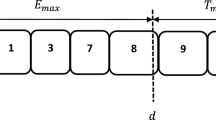Abstract
Priority dispatching for minimizing job tardiness has been the subject of research investigation for several decades. Minimizing weighted tardiness however has considerably more practical relevance, but for this objective only a few dispatching rules have been advanced and scientifically compared. We introduce here a new rule, which we call “Weighted Modified Due Date” (WMDD) and test its effectiveness against other competing rules that have been developed for weighted tardiness. The test is accomplished via a simulation study of a simple queueing system and by static problem analysis. The WMDD rule is found to compare favorably to all the rules tested.
Similar content being viewed by others
REFERENCES
Abdul-Razaq, T. S., C. N. Potts, and L. N. van Wassenhove, “A Survey of algorithms for the single machine total weighted tardiness scheduling problem,” Discrete Appl. Math., 26, 235–253 (1990).
Adler, L., N. M. Fraiman, E. Kobacker, M. Pinedo, J. C. Plotnitcoff, and T. P. Wu, “BPSS: A scheduling system for the packaging industry,” Oper. Res., 41, 641–648 (1993).
Akturk, M. S. and M. B. Yildirim, “A new lower bounding scheme for the total weighted tardiness problem,” Comput. Oper. Res., 25(4), 265–278 (1998).
Arkin, E. M. and R. O. Roundy, “Weighted-tardiness scheduling on parallel machines with proportional weights,” Oper. Res., 39(1), 64–81 (1991).
Baker, K.R., “Sequencing rules and due date assignments in a job shop,” Manage. Sci., 30, 1093–1104 (1984).
Baker, K. R. and J. W. M. Bertrand, “A dynamic priority rule for scheduling against due-dates,” J. Oper. Manage. 3(1), 37–42 (1983).
Baker, K. R. and J. J. Kanet, “Job shop scheduling with modified due dates,” J. Oper. Manage. 4(1), 11–22 (1983).
Baker, K. R. and J. J. Kanet, “Improved decision rules in a combined system for minimizing job tardiness,” Int. J. Prod. Res., 22(6), 917–922 (1984).
Bhaskaran, K. and M. Pinedo, “Dispatching,” in G. Salvendy (ed.), Handbook of Industrial Engineering, John Wiley & Sons, New York, 1992, pp. 2184–2198.
Carroll, D. C., “Heuristic sequencing of single and multiple component jobs,” Ph.D. Thesis, Sloan School of Management, MIT, Cambridge, MA, 1965.
Chu, C. and M.-C. Portmann, “Some new efficient methods to solve the n/1/r i /∑ Ti scheduling problem,” Eur. J. Oper. Res., 58, 404–413 (1992).
Du, J. and J. Y. T. Leung, “Minimizing total tardiness on one machine is NP-hard,” Math. Oper. Res., 15(3), 483–495 (1990).
Duncan, D. B., “Multiple range and multiple F-tests,” Biometrics, 11, 1–42 (1955).
Huegler, P. A. and F. J. Vasko, “A performance comparison of heuristics for the total weighted tardiness problem,” Comput. Ind. Eng., 32(4), 753–767 (1997).
Kanet, J. J. and J. C. Hayya, “Priority dispatching with operation due dates in a job shop” J. Oper. Manage., 2(4), 167–176 (1982).
Kanet, J. J. and X. Li, “On Adjacent Job Precedence for 1‖∑ wjTj ” working paper, University of Dayton, 2002.
Kanet, J. J. and Z. Zhou, “A decision theory approach to priority dispatching for job shop scheduling,” Prod. Oper. Manage., 2(1), 2–14 (1993).
Koulamas, C. P., “The total tardiness scheduling problem: Review and extensions,” Oper. Res., 42, 1025–1041 (1994).
Lawler, E., “A ‘Pseudopolynomial’ algorithm for sequencing jobs to minimize total tardiness,” Ann. Discrete Math., 1, 331–342 (1977).
Lee, Y. H., K. Bhaskaran, and M. Pinedo, “A heuristic to minimize the total weighted tardiness with sequence-dependent setups,” IIE Trans., 29, 45–52 (1997).
Mason, S. J., J.W Fowler, and W. M. Carlyle, “A modified shifting bottleneck heuristic for minimizing total weighted tardiness in complex job shops,” J. Scheduling, 5(3), 247–262 (2002).
Morton, T E. and D. W. Pentico, Heuristic Scheduling Systems with Applications to Production and Project Management, John Wiley & Sons, New York, 1993.
Pinedo, M., “Scheduling,” in G. Salvendy (ed.), Handbook of Industrial Engineering, John Wiley & Sons, New York, 1992, pp. 2131–2153.
Potts, C.N. and L. N. Van Wassenhove, “A branch and bound algorithm for the total weighted tardiness problem,” Oper. Res., 33, 363–377 (1985).
Rachamadugu, R. V., “A note on the weighted tardiness problem,” Oper. Res. 35(3), 450–452 (1987).
Raman, N., R. V. Rachamadugu, and F. B. Talbot, “Real time scheduling of an automated manufacturing center,” Eur. J. Oper. Res., 40, 222–242 (1989).
Smith, W. E., “Various optimizers for single-stage production,” Naval Res. Logistics Quar., 3, 59–66 (1956).
Szwarc, W. and J. J. Liu, “Weighted tardiness single machine scheduling with proportional weights” Manage. Sci., 39(5), 626–632 (1993).
Vepsalainen, A. P. and T. E. Morton, “Priority rules for job shops with weighted tardiness costs,” Manage. Sci., 33(3), 1035–1047 (1987).
Volgenant, A. and E. Teerhuis, “Improved heuristics for the n-job single-machine weighted tardiness problem,” Comput. Oper. Res., 26(1) 35–44 (1999).
Author information
Authors and Affiliations
Corresponding author
Rights and permissions
About this article
Cite this article
Kanet, J.J., Li, X. A Weighted Modified Due Date Rule for Sequencing to Minimize Weighted Tardiness. Journal of Scheduling 7, 261–276 (2004). https://doi.org/10.1023/B:JOSH.0000031421.64487.95
Issue Date:
DOI: https://doi.org/10.1023/B:JOSH.0000031421.64487.95



